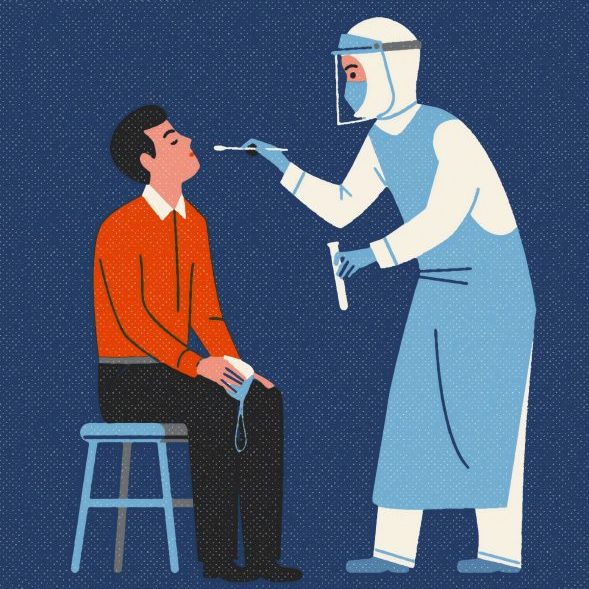JAMA article provides primer for understanding COVID-19 diagnostic testing

Cheryl Guttman Krader
Published: Tuesday, May 12, 2020
 Authors of a Viewpoint published online in JAMA on May 6, 2020 provide an overview of diagnostic tests for SARS-CoV-2. In their article, Dr Nandini Sethuraman et al explain test methodologies, review performance, and provide a graphical depiction of how the testing results may vary over time.
As a caveat for interpreting testing, they note that the information presented is mostly derived from studies of symptomatic immunocompetent adults and that testing outcomes may differ in other populations, including children and and asymptomatic individuals.
Reverse transcriptase-polymerase chain reaction (RT-PCR) testing to detect viral RNA is considered the most reliable method for diagnosing COVID-19 and has a reported specificity of 100%. False-negative results can occur, however, mostly because of improper technique for sample collection or the timing of sample collection. Furthermore, a positive result indicates presence of viral RNA but does not necessarily indicate presence of viable virus.
Testing can be done with a specimen obtained by a nasopharyngeal swab, upper respiratory tract specimen, or saliva. Tests from different manufacturers identify different gene targets, but with one exception they appear to have similar sensitivity.
The rate and timeline of RT-PCR positivity varies depending on the type of specimen used for the testing. In people who are symptomatic with COVID-19, viral RNA in a nasopharyngeal swab can usually be detected on the day of symptom onset. Positivity starts to decline by 3 weeks. Persistence of positivity is longer in patients who were more severely ill with COVID-19 and with sputum samples compared with nasopharyngeal swabs.
Serological testing that detects antibodies to SARS-CoV-2 is helpful for diagnosing COVID-19 in people who were mild to moderately ill from the infection and only present for testing more than 2 weeks after symptom onset. It is also considered to have a role for evaluating community levels of infection and potentially as a test for immunity, although the persistence of neutralising antibodies and how long they might provide protection from future infection are not known.
An antibody test may be positive by four days after symptom onset, but levels are higher after two or three weeks. Tests using ELISA to measure IgM and IgG antibodies have very high specificity for diagnosing COVID-19 (>95%). Different tests measure antibodies to different viral proteins and these vary in sensitivity and specificity. There may also be cross-reactivity with antibodies to SARS-CoV and other coronaviruses.
Point-of-care antibody tests are now available. They generate a qualitative result only (positive or negative) and their quality varies.
Authors of a Viewpoint published online in JAMA on May 6, 2020 provide an overview of diagnostic tests for SARS-CoV-2. In their article, Dr Nandini Sethuraman et al explain test methodologies, review performance, and provide a graphical depiction of how the testing results may vary over time.
As a caveat for interpreting testing, they note that the information presented is mostly derived from studies of symptomatic immunocompetent adults and that testing outcomes may differ in other populations, including children and and asymptomatic individuals.
Reverse transcriptase-polymerase chain reaction (RT-PCR) testing to detect viral RNA is considered the most reliable method for diagnosing COVID-19 and has a reported specificity of 100%. False-negative results can occur, however, mostly because of improper technique for sample collection or the timing of sample collection. Furthermore, a positive result indicates presence of viral RNA but does not necessarily indicate presence of viable virus.
Testing can be done with a specimen obtained by a nasopharyngeal swab, upper respiratory tract specimen, or saliva. Tests from different manufacturers identify different gene targets, but with one exception they appear to have similar sensitivity.
The rate and timeline of RT-PCR positivity varies depending on the type of specimen used for the testing. In people who are symptomatic with COVID-19, viral RNA in a nasopharyngeal swab can usually be detected on the day of symptom onset. Positivity starts to decline by 3 weeks. Persistence of positivity is longer in patients who were more severely ill with COVID-19 and with sputum samples compared with nasopharyngeal swabs.
Serological testing that detects antibodies to SARS-CoV-2 is helpful for diagnosing COVID-19 in people who were mild to moderately ill from the infection and only present for testing more than 2 weeks after symptom onset. It is also considered to have a role for evaluating community levels of infection and potentially as a test for immunity, although the persistence of neutralising antibodies and how long they might provide protection from future infection are not known.
An antibody test may be positive by four days after symptom onset, but levels are higher after two or three weeks. Tests using ELISA to measure IgM and IgG antibodies have very high specificity for diagnosing COVID-19 (>95%). Different tests measure antibodies to different viral proteins and these vary in sensitivity and specificity. There may also be cross-reactivity with antibodies to SARS-CoV and other coronaviruses.
Point-of-care antibody tests are now available. They generate a qualitative result only (positive or negative) and their quality varies.